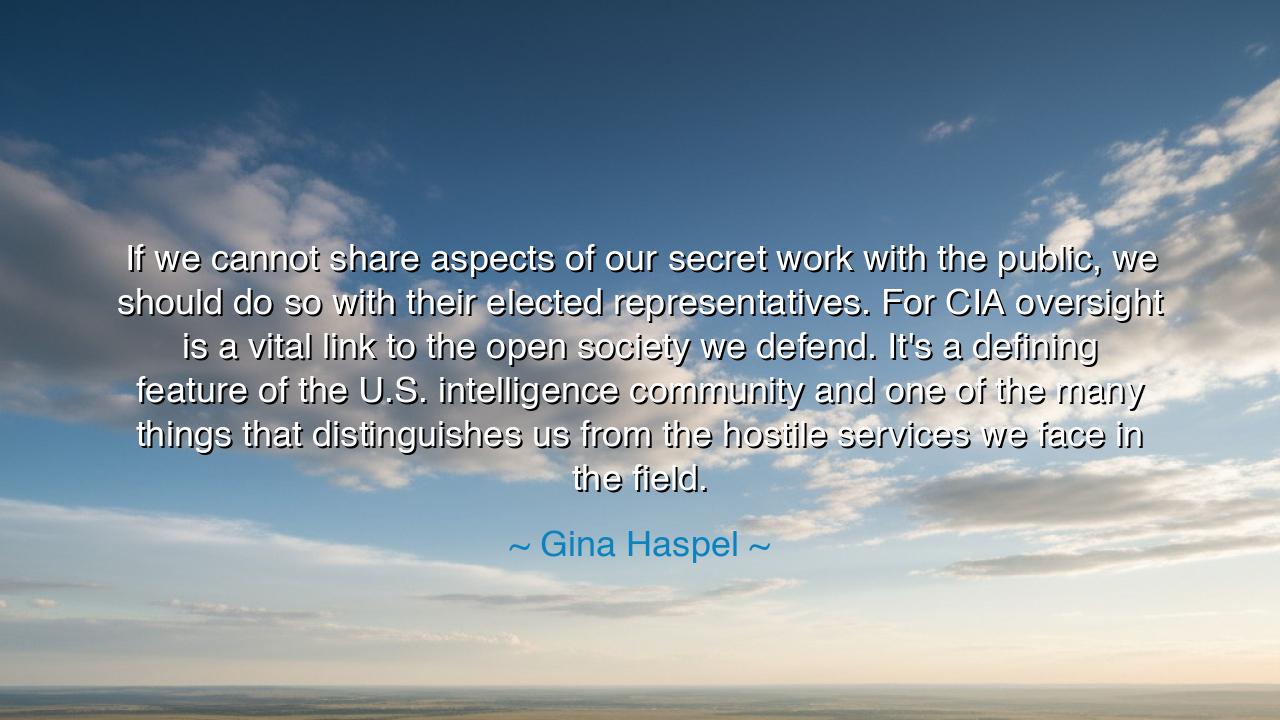
If we cannot share aspects of our secret work with the public, we
If we cannot share aspects of our secret work with the public, we should do so with their elected representatives. For CIA oversight is a vital link to the open society we defend. It's a defining feature of the U.S. intelligence community and one of the many things that distinguishes us from the hostile services we face in the field.






In the insightful words of Gina Haspel, "If we cannot share aspects of our secret work with the public, we should do so with their elected representatives. For CIA oversight is a vital link to the open society we defend. It's a defining feature of the U.S. intelligence community and one of the many things that distinguishes us from the hostile services we face in the field," we encounter a powerful reflection on the relationship between governmental transparency, democratic accountability, and national security. Haspel reminds us that even in the shadowy world of intelligence, where much must remain hidden for the sake of safety and strategy, there is a vital need for oversight and responsibility. The actions of those who serve to protect the nation must remain tethered to the principles of openness, accountability, and trust that define a healthy society.
This concept is as ancient as governance itself. The Romans, in their development of the republic, understood the necessity of a system of checks and balances, where the actions of rulers and public servants were subject to the scrutiny of the people or their representatives. The philosopher Cicero, in his defense of the republic, emphasized that freedom and justice depend on the public’s awareness of those who govern. For a government to serve its people, the leaders must remain accountable to them, even in matters of statecraft. Haspel’s statement is a modern reflection of this timeless wisdom: that while some secrets must be kept for the sake of security, they must not remain forever hidden from the watchful eye of democratic oversight.
Consider the example of King Solomon, who in his wisdom, sought to judge justly and ensure that the actions of his government were always aligned with the greater good of his people. The Bible recounts how Solomon's wisdom in judgment was not just about understanding what was right but about ensuring that justice was not obscured by power. He recognized the importance of transparency in his rule, whether in public matters or in secretive affairs of state. Similarly, in the modern context, the actions of intelligence agencies like the CIA, which often deal with sensitive matters of national security, must be subject to the scrutiny of elected representatives, to ensure that the secrecy that is necessary for security does not undermine the accountability that is essential for democracy.
Haspel’s words also call attention to the importance of oversight in distinguishing democratic societies from those who operate in secrecy and without accountability. Throughout history, we have seen the dangers of unchecked power in the form of tyranny. The Stalinist regime in the Soviet Union, for example, operated in complete secrecy, with the actions of its intelligence services—most infamously, the NKVD—unquestioned by the public. This unchecked power led to widespread corruption, fear, and the oppression of millions. In contrast, the democratic ideal is one where even the most powerful institutions are subject to the rule of law and to scrutiny by those who represent the will of the people. CIA oversight, as Haspel notes, is a safeguard against the erosion of this democratic principle.
The lesson here is that the actions of even the most secretive institutions must remain aligned with the values of openness and accountability. The balance between maintaining secrecy for national security and ensuring transparency through oversight is delicate but essential. Without this balance, power can easily become unchecked, leading to abuses and the erosion of public trust. As Haspel points out, the U.S. intelligence community is distinguished not only by its capabilities but also by its commitment to oversight—a commitment that serves to ensure that its powerful tools are used responsibly and in the best interest of the people it is meant to protect.
In practical terms, we must remember that oversight is a key pillar of any healthy democracy. Just as Haspel advocates for CIA oversight, we must demand transparency and accountability in all aspects of governance—whether in intelligence, military affairs, or public policy. When we, as citizens, place our trust in elected representatives, it is not a blind trust but one rooted in the expectation that they will hold the institutions of power to account. By supporting such oversight, we ensure that the secrets that are necessary for security are always balanced with the freedom and rights of the people.
Thus, the practical action we must take in our own lives is to stay informed and engaged in the process of democratic accountability. We must support those systems of oversight that ensure our government remains transparent and responsible to the people. Whether it’s through voting, advocacy, or active participation in public dialogue, we must make our voices heard in demanding that even the most secretive arms of the state are subject to scrutiny. For it is through such accountability that we ensure our freedoms are safeguarded and that the powers that protect us never overstep their bounds.






AAdministratorAdministrator
Welcome, honored guests. Please leave a comment, we will respond soon